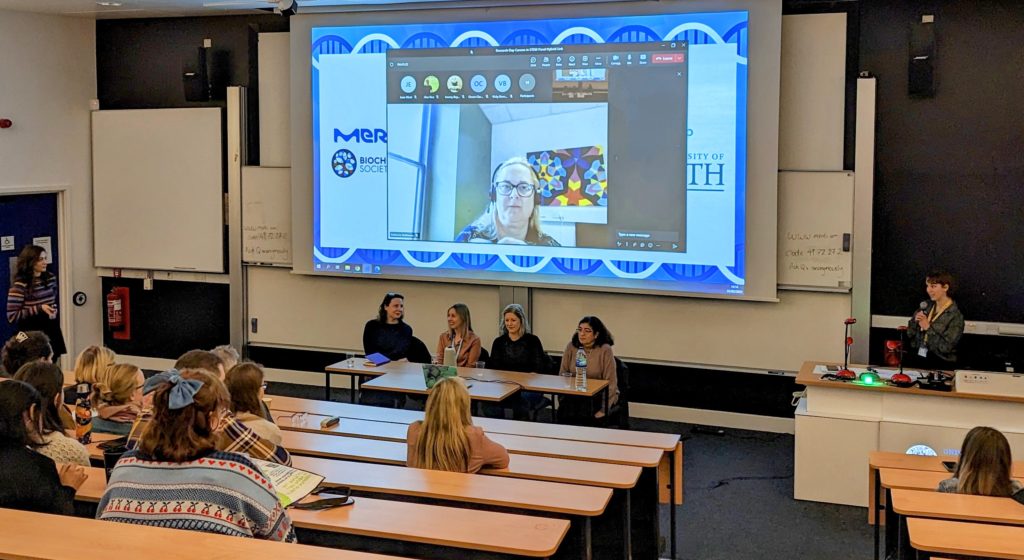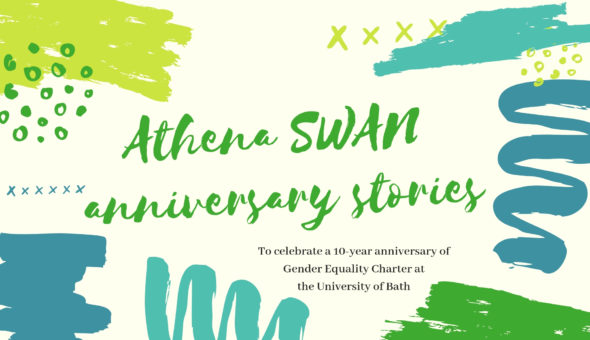To mark International Day for Women and Girls in Science on 11th February, we invited Josie Elliott, PhD in Research Programme in Biosciences, to talk about Life Sciences Department’s Research Day and key lessons learnt there. Over to you, Josie!
This past week I was part of the organisational team for the Life Sciences Department’s Research Day – a two-day event where we showcased talks and posters from our department’s researchers. As much as I enjoy a talk on the evolution of diving in birds, or a poster on urinary tract infections, I’ll admit I was most excited for our final session of the event – a careers panel that featured five women who all had diverse and exciting careers around STEM.

When the ‘yes I can come’ emails from each of these speakers hit my inbox over the weeks and months, I eagerly updated my office colleagues on the different career paths that would be represented on the panel. Featured left to right we were joined by: Joanna Jenkinson, director of the GW4 alliance who previously worked in the UK governmental research funding bodies the BBSRC and MRC. Elaine Lovelady, a senior scientist at the R&D team at the medical devices company Abbots Diabetes Care. Charlie Hamley-Bennett, a principal scientist at the University of Bristol spin-out company Zentraxa. Begoña Delgado-Charro, a professor of Biopharmaceutics here at the University of Bath. We also had joining us virtually the director of the Royal institution, Katherine Mathieson, who has worked in science communication and engagement throughout her career.
I can’t summarise all the excellent advice and life experience offered by the panel in just one piece of writing but here are five things I learned from the themes and talking points we touched on during the panel.
Number 1: People people people
People are important, I’m sure you’ll have heard this before, but it’s worth repeating. Unsurprisingly there were mentions of important mentors that helped our panellists get to where they are today. However, I want to highlight the other ways communities play an important role in our careers. One thread brought up was the importance of having a supportive cohort around you. For example, our peers can give crucial validation to our own experiences of casual sexism at work. Sharing experiences allows us to draw patterns, receive support, and gives us a better mandate for making change. More encouragingly, the panellists discussed how now that they are further up the career ladder, they have been better able to create more inclusive systems and cultures in their own workplaces. It felt good to hear that some of the people I look up to are looking out for people like me.
Number 2: Honesty really is the best policy
A question from the audience on maternity cover led to a discussion from some of the mothers on the panel about balancing work and childcare. One common denominator that drew together the differing perspectives on how to prioritise work and parental responsibilities was honesty. Telling people at work you won’t be in that afternoon because there’s a school play normalises caring responsibilities in the workplace. Having the person organising teaching hours know you have children means they can make sure you get more choice on overtime. Even being honest with yourself about what help you need and how using childcare might affect your family dynamics is important. All these were examples where honesty helped mothers navigate their careers, and many of these lessons apply to more broadly to other caring responsibilities.
Number 3: You can’t anticipate the external forces that’ll shape your career
Staring ahead into the abyss of uncertainty that is your own career path, it can often feel that you need to see the whole bridge ahead to be confident stepping out into the void. However, to counter this idea, at the start of the panel I had asked our panel members to share their CV overview and then share their actual career journey – which were always much messier and less straight forward than the bird’s eye-CV-view. Something that was highlighted was that completely unpredictable changes in people’s lives formed the cornerstones of many career decisions. For one speaker this was the advent of caring responsibilities that restricted their ability to move for jobs, so they drew a circle on a map of where they could commute to and applied for jobs in that zone. For another panel member, the pandemic led to them deciding to change jobs as their company’s continued work from home policy just wasn’t for them and they wanted back to the office. From these discussions I got some perspective that any plans I make now might be re-routed by priorities or opportunities I can’t even imagine yet, so I’m going to try and take the pressure off.
Number 4: Turns out, everyone gets rejected… sometimes a lot…
I’m sure many of us share the experience that when we see yet another friend or acquaintance post their new job on social media, the continued highlight reel of everyone else’s life can leave us wondering why our own inboxes are full of ‘we regret to inform you’ or worse, no replies at all… Thus, it was oddly inspiring to see that when our panellists shared their career journeys there often periods of rejection, be it 12 months of weekends spent on failed job applications, grants missed out on, or being told they were ‘unsuccessful but appointable’ for the promotion… again. When asked the question of how you persevere in the face of periods of rejection our panellists were candid in saying ‘you just have to keep going’, and to remember that bitter disappointments don’t predict future disappointments. While this is true, learning that the career journeys I saw in front of me all involved periods of rejection and frustration will make it that bit easier for me find that perseverance myself in future.
Number 5: I may not “have it all” but I have “most of what I have identified as key”
I’m dedicating this final section to borrowing some of the phrases used by the University of Bath’s own esteemed professor, Begoña Delgado-Charro, during our panel. She told the audience that maybe she wasn’t at the highest level she could have achieved, or maybe she could have climbed the ladder faster, but she has what she needs while still living a holistic life. When we look in envy at people’s careers it’s worth stopping and asking – do we actually want their life? Their whole life, with all the sacrifices and priorities they’ve made too? Whilst we may constantly look to excel and achieve, especially in academic science, Begoña made sure to remind us in her talk that: if it doesn’t work for me, or makes me very unhappy, it is not worth it.
Myself and all the early career researchers who sat in the audience of the panel are grateful to the five panellists, Joanna, Elaine, Charlie, Begoña, and Katherine for giving up their valuable time for the event. I hope these five lessons do some justice to all their offered wisdom.
Respond
